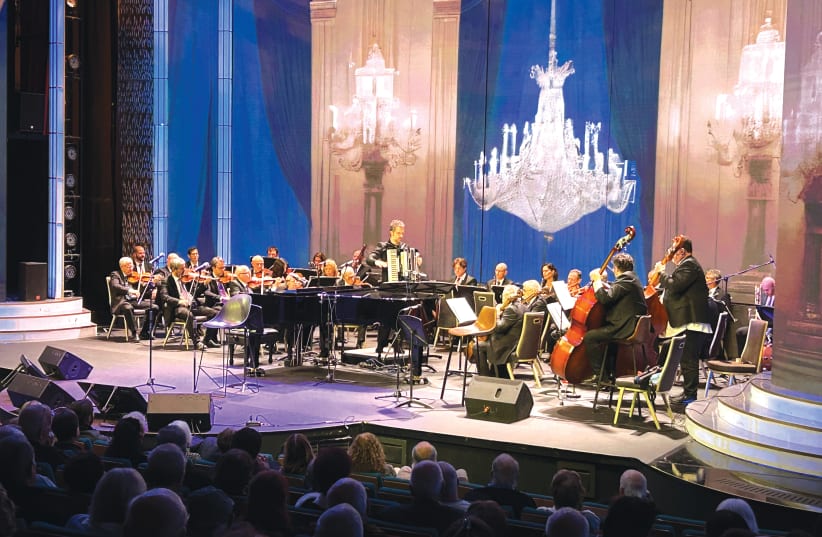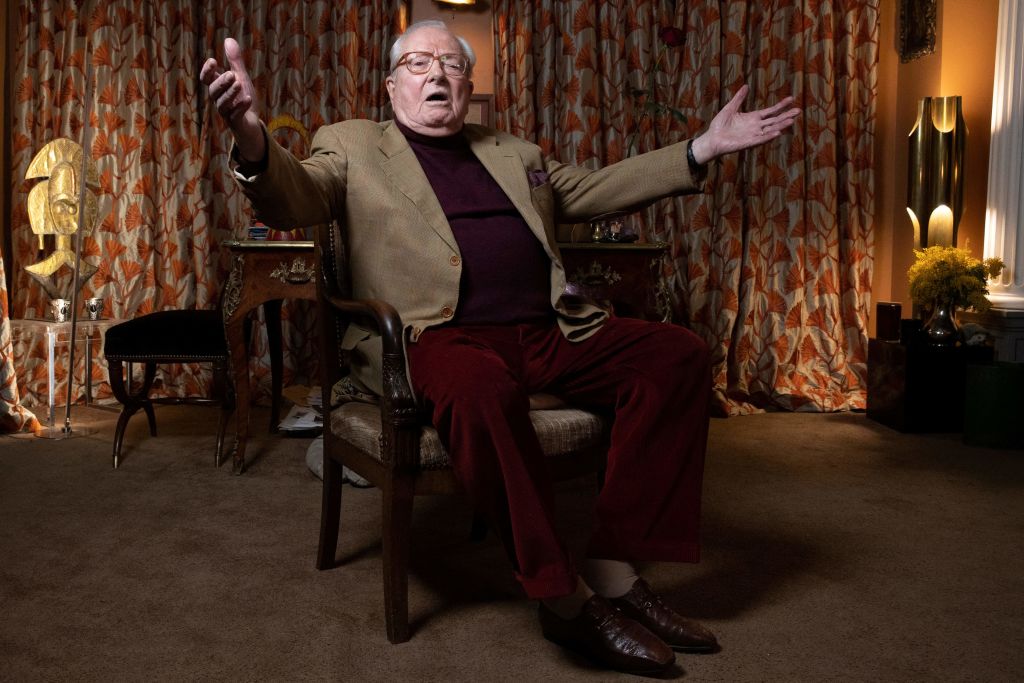That sounds like a deliciously inviting school of musical thought and one that augurs well for an entertaining, fun, and enriching time down in Eilat.
By BARRY DAVIS JANUARY 6, 2025 00:45 THE RAANANA Symphonette Orchestra performs Vivaldi’s ‘Four Seasons’ with Omer Wellber on accordion.
(photo credit: Isrotel Classicameri Festival)
THE RAANANA Symphonette Orchestra performs Vivaldi’s ‘Four Seasons’ with Omer Wellber on accordion.
(photo credit: Isrotel Classicameri Festival)
For some, to my mind strange, reason Eilat tends to draw the vacationing crowds in the summer. That may be down to the practicality of the kids being off school, or employers being more amenable to the idea of their charges downing tools for a week or two at that time of the year. Either way, it is devilishly hot in our southernmost resort in July and August.
But Eilat in the winter can be simply delectable. Instead of racing from air-conditioned hotel room to similarly artificially cooled shopping mall, followed by an hour or two under a shade by the hotel pool, or by the sea, right now you can mosey your way around the place, and enjoy some gentle soothing rays while you’re at it. You may even be tempted to take a dip in the Red Sea which, regardless of the seasonal meteorological conditions, has a hardly noticeable year-round temperature variance of just two degrees.
Winter is also a great time to head down there to catch some richly variegated musical offerings courtesy of the annual Classicameri Festival which takes place in Eilat for the 26th year, courtesy of the Isrotel hotel chain, January 9-12.
Celebrated conductor-conductor Omer Meir Wellber is, once again, in charge of the programming rollout and, as usual, will be very much hands-on throughout the festival, both on the conductor’s dais and squeezing melodic runs from the accordion.
He will, no doubt, imbue the proceedings with his trademark joie de vivre, not to mention fine musicianship, when he makes the trip over here from Europe where, after completing a two-year stint with the Vienna Volksoper, he is gainfully employed on the concert circuit. He is also due to take up a prestigious posting as music director of the Elbphilharmonie, in Hamburg, and the Hamburg State Opera.
He takes a delightfully eclectic, non-discriminatory approach to music.
So it comes as no surprise to find a slot in this year’s festival with the long-running Parvarim Duo, which started out all the way back in 1960, in the Eilat lineup. The original twosome personnel has shifted a couple of times in the interim, but the folksy repertoire and mellifluous close harmony singing style have not changed significantly. Wellber will play accordion in the Singing The Parvarim concert of Israeli classics, with David Sebba on piano. They will share the stage with the Ra’anana Symphonette Orchestra, the perennial festival house band, with whom Sebba serves as conductor-in-residence and Wellber as music director.
Foreign representation
THERE ARE a couple of stellar foreign turns in the program. Russian-Italian violinist Sergei Krylov stars in the well-named Virtuoso from Moscow performance on the first evening as soloist in Paganini’s Violin Concert No. 1, with Wellber conducting the Ra’anana Symphonette. The show closes with Haydn’s Symphony No. 49.
The other offshore spot is occupied by 60-year-old New York resident German cellist Jan Vögler. He takes center stage at 5 p.m. on January 10, when he joins Wellber and the instrumental ensemble in a program of Viennese works. The repertoire for the occasion goes every merry which way, and features a medley of half a dozen works by Johann Strauss II. They follow the adventurous opener, Concerto for Cello and Wind Orchestra by genre boundary-leaping Austrian pianist and composer Friedrich Gulda, who died in 2000.
Vögler says he anticipates having a ball with that.
Stay updated with the latest news!
Subscribe to The Jerusalem Post Newsletter
“It is a very playful piece. That fact makes it very fun to work on and I always enjoy practicing it.” It also looks quite a technical skill mountain to climb. The cellist is happy to go with that challenging flow.
“The virtuosic passages are born out of the combination of styles,” he notes. “Gulda had the fantastic idea to mix classical, folk, rock and jazz, and was one of the first composers who dared [to write] what we call ‘crossover’ now.”
The cellist, who has worked with Wellber on numerous occasions, will be back on the morrow for the grand finale, the Gala Concert, at 9 p.m., which promises to bring the curtain down on the festival in style. The presence of Mizrachi-leaning singer-songwriter Shimon Buskila should add some girth to the delivery palette. Krylov and Sebba are also on the bill, as well as “more surprise guests.” The set list is being kept under wraps, and Vögler neatly sidestepped my prodding. “I will not play any pieces that were originally written for the cello,” was all he would reveal.
Interestingly, Vögler was born and grew up in East Berlin, and I wondered how that shaped him as a person and a musician. As a rule, the people I have known who started life on the other side of the Iron Curtain say that while there were numerous existential minefields to negotiate, such as the seemingly simple matter of buying a fresh loaf of bread, education, and culture were in ample and quality supply.
Vögler was indeed blessed in that department. “I was very lucky to grow up in an intellectual family. The combination of the gray daily life in East Berlin and a wealth of artistic inspiration was unique.” The youngster was spoiled for inspirational choice, domestically as well as in his general cultural milieu.
“My father was a cellist at the Komische Oper in Berlin. The opera productions there were fabulous and we kids slowly got to know them all. My mother was a violinist in what is today called the Konzerthaus Orchestra. We would hear lots of great soloists, mostly from Eastern Europe. We also frequently went to the theater and our home was full of books of authors from all over the world. I still very much carry the basic approach to art from that time with me.”
Those cultural forays were augmented by the recorded work of titans of the field.
“I mostly listened to classical music,” Vögler recalls. “My parents had a lot of fantastic recordings and I would listen to great cellists like Casals, Rostropovich, and Piatigorsky. But also to pianists like Richter and Rubinstein, or violinists like Kogan, Oistrach, and Menuhin.”
Vögler started on the cello at the age of six and says he began taking his music studies seriously when he was 10. Vögler Sr. was, naturally, in on the early tuition act at what the latter calls “the critical age, from 14 to 18.” Hungarian-born cellist Josef Schwab also played a major part in the young cellist’s emergence. Vögler says he benefited from some quality stock. “Like my father, Schwab came from the Leipzig school of playing that goes back to [late 19th to early 20th-century German cellist] Julius Klengel.”
Those mentors clearly did a good job, and Vögler made rapid strides, becoming principal cellist of 500-year-plus old Staatskapelle Dresden at the tender age of 21. That was a game-changer.
“I learned so much from playing the operatic and symphonic repertoire. But most importantly, I learned to gently but firmly lead a section of players of all ages and different characters.”
Then it was off to less structured performance climes. “To be free and always imagine that you are flying like a bird high above the trees,” Vögler says, when I asked him what he got out of embarking on a soloist career. “As a principal cellist I still often felt like a craftsman, when I started my solo career I realized that I could dare to be an artist, with my very own ideas and styles.”
Vögler “confesses” to venturing into ostensibly extra-mural musical domains, such as jazz and blues. He says he admires the work of preeminent jazz trumpeter Wynton Marsalis “for his style and precision” and has actually mixed it with iconic blues-rock guitarist-vocalist Eric Clapton. “That was so much fun!” he exclaims.
That suggests an open mind when it comes to repertoire selection which, naturally, suits the Wellber philosophy.
“Omer and I are friends and we have played in a lot of places together and have performed a wide range of concertos together,” he notes, adding they are always happy to dip into multifarious musical seams. “I love working with Omer and I share his sense of adventure.
“We recorded an album together that is called Pop Songs. It tells the story of the pop song from the early opera arias to Michael Jackson.”
That sounds like a deliciously inviting school of musical thought and one that augurs well for an entertaining, fun, and enriching time down in Eilat.
For more information: *5585 and www.isrotel.co.il

 By The Jerusalem Post (World News) | Created at 2025-01-05 23:25:07 | Updated at 2025-01-07 14:01:41
1 day ago
By The Jerusalem Post (World News) | Created at 2025-01-05 23:25:07 | Updated at 2025-01-07 14:01:41
1 day ago








